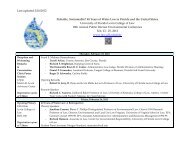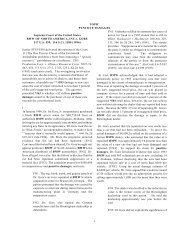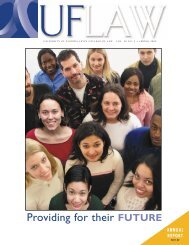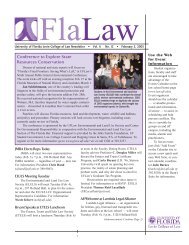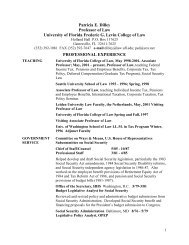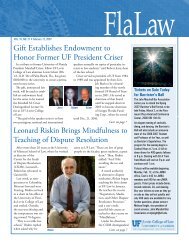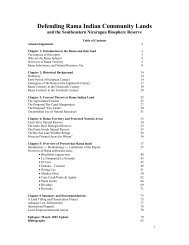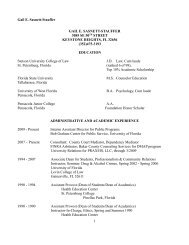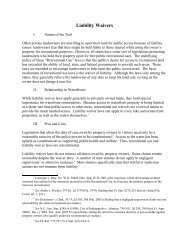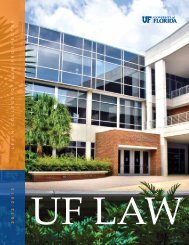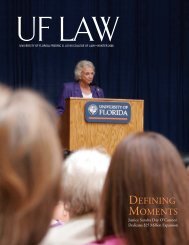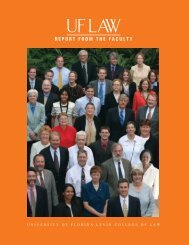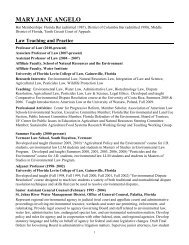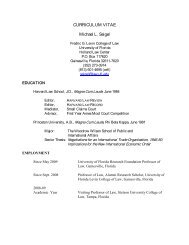Security for Low Wage Workers.” Sheaccepted the award at a luncheon inNew York, and a synthesis <strong>of</strong> the finalpapers will be made available to policymakers, congressional staff, executivebranch transition teams, and otherstakeholder communities (2008)Nancy E. DowdChesterfield Smith Pr<strong>of</strong>essor <strong>of</strong> <strong>Law</strong>;Co-director, Center on Childrenand Families■ Participated in panel discussion,“Masculinities Theory and LegalInterpretation,” Southeastern Association<strong>of</strong> <strong>Law</strong> Schools Meeting (July 2008)■ Moderated two panel sessions,International Society <strong>of</strong> Family <strong>Law</strong>,13th World Conference, Vienna,Austria (September 2008)Mark FensterUF Research Foundation Pr<strong>of</strong>essor■ Published Conspiracy Theories:Secrecy and Power in AmericanCulture (rev. 2 nd ed., <strong>University</strong> <strong>of</strong>Minnesota 2008)■ Presented “After Lingle,” 11 th AnnualGeorgetown Environmental <strong>Law</strong> &Policy Institute Litigating TakingsConference, Stanford <strong>Law</strong> School(November 2008)■ Presented “Democratic PropertyOwnership and the Commodification<strong>of</strong> Community,” Property Works inProgress Conference, <strong>University</strong> <strong>of</strong>Colorado <strong>Law</strong> School (June 2008)■ Presented “The Dilemmas <strong>of</strong> LocalTransparency,” Annual Meeting, <strong>Law</strong>& Society Association, Montreal (May2008)Joan D. FlocksDirector, Social Policy Division, Centerfor Governmental Responsibility■ Testified on “Agricultural Exposures:Pesticide Policy and Farmworkers”before the President’s Cancer Panel(created in 1971 to annually advisethe president on cancer policy),Indianapolis, Ind. (October 2008)■ Presented “From the Public’sPerspective: Land Use and Socio-Environmental Justice in <strong>Florida</strong>,”<strong>University</strong> <strong>of</strong> <strong>Florida</strong> / <strong>University</strong> <strong>of</strong>Costa Rica Conference, San Jose,Costa Rica (June 2008)■ Presented “The Political Economy<strong>of</strong> Pesticides,” Annual Conferenceon Legal and Policy Issues in theAmericas, Rio de Janeiro, Brazil (May2008)Book round-up: Jon MillsPrivacy: The Lost RightTechnology has intruded into every aspect <strong>of</strong> modern life,from how people die to how they conduct their public andprivate business. Although the benefits <strong>of</strong> technology areobvious, the risks can be huge.That’s because every cell phone call, credit card transaction,discount card purchase, Internet site visited, or e-mail sentor received is fair game for information poachers t<strong>of</strong>ilch at will and without your knowledge. So statesa new book released this month, Privacy: TheLost Right (Oxford <strong>University</strong> Press), authored byJon Mills, a <strong>University</strong> <strong>of</strong> <strong>Florida</strong> <strong>Levin</strong> <strong>College</strong><strong>of</strong> <strong>Law</strong> pr<strong>of</strong>essor, dean emeritus, and founder<strong>of</strong> the university’s Center for GovernmentalResponsibility.“Technology has moved too fast for thelaw, which is not totally surprising,” saidMills. “The combination <strong>of</strong> the Internet anda broad range <strong>of</strong> scientific advances, likegenetic testing, has created informationand societal changes with which the lawhas not been able to keep pace.”Privacy: The Lost Right draws on Mills’academic, courtroom and legislative experiencesand explores examples <strong>of</strong> privacy intrusions enabledby technology ranging from disclosure <strong>of</strong> privateonline video rentals, Internet purchasing habits,spyware that tracks personal online viewing habits,governmental and corporate intrusions, andsalacious or defamatory Web postings made byanonymous bloggers. He outlines the legal protections peoplehave — or don’t have — to prevent these intrusions, and <strong>of</strong>fersoptions to bolster legal protections <strong>of</strong> privacy.Mills also relates his personal experiences as an attorneywho has made successful arguments in several, high-pr<strong>of</strong>ilecourt cases that have defined the First Amendment boundaries<strong>of</strong> the press’ right to know and an individual’s right to privacy.These included blocking the release <strong>of</strong> grisly autopsy photos<strong>of</strong> six young people murdered by serial killer Danny Rolling,preventing the posting <strong>of</strong> Dale Earnhardt Sr.’s autopsy photosto the Internet, and closing the homicide investigation filecontaining detailed personal information on murdered fashionmogul Gianni Versace.These cases were sensationalized in the media and rivetedpublic attention, but the privacy invasions <strong>of</strong> the information agethat don’t garner any attention can do equal harm, said Mills.“People are unaware <strong>of</strong> how many intrusions they faceduring everyday life because it is not in any intruders’ interest toput the public on notice, and when they do it’s usually only inthe fine print,” said Mills. “We don’t know when somebody hasgathered and sold our private information, we don’t know thatsomebody looked at our medical records and that it affected theway we were treated in a job search.”Mills said it is not just government or the press or theanonymous bloggers or the data brokers that have the abilityto violate our privacy rights, it’s all <strong>of</strong> the above together.Although Americans enjoy the conveniences <strong>of</strong> the Internet,camera phones and online commerce, Mills contends few <strong>of</strong> ussurrendered all privacy for convenience — at least not knowingly.“Americans cherish their privacy and the legal tools thatprotect it. At no time in our history have the challenges topersonal privacy been so great,” said Janet Reno, former U.S.attorney general. “Jon Mills is uniquely qualified through legal,political and academic experience to address these challenges.”88 UF LAW
NOTAS BENEAlyson FlournoyUF Research Foundation Pr<strong>of</strong>essor;Alumni Research Scholar; Director,Environmental and Land Use <strong>Law</strong>Program■ Published “Harnessing the Power<strong>of</strong> Information to Protect Our PublicNatural Resource Legacy” (with HeatherHalter and Christina Storz), 86 Tex. L.Rev.1575 (2008)■ Published “Supply, Demand,and Consequences: The Impact<strong>of</strong> Information Flow on IndividualPermitting Decisions under Section 404<strong>of</strong> the Clean Water Act,” 83 Indiana L.J. 537 (2008)■ Presented “Protecting a NaturalResource Legacy While PromotingResilience: Can It Be Done?” <strong>University</strong><strong>of</strong> Nebraska School <strong>of</strong> <strong>Law</strong> (September2008)Michael K. FrielPr<strong>of</strong>essor; Associate Dean and Director,Graduate Tax Program■ Published Taxation <strong>of</strong> IndividualIncome (with Martin Burke) (LexisNexis,8th ed., 2007 & 2008 Supp.)■ Published Understanding FederalIncome Taxation (with Martin Burke)(3rd ed., 2008)■ Published Treatise, Modern EstatePlanning (with Martin Burke and ElaineGagliardi) (2nd ed., 2004-2008)Michael W. GordonJohn H. and Mary Lou DasburgPr<strong>of</strong>essor-Emeritus■ Published International Civil DisputeResolution (with Baldwin, Brand andEpstein) (West. 2nd ed. 2008)■ Elected as a Fellow in the AmericanBar Foundation■ Provided expert testimony on foreignlaw in a trial in the Supreme Court <strong>of</strong>Bermuda (July 2008)Richard HamannAssociate In <strong>Law</strong>■ Published “Where Did Our Water Go?Give the <strong>Law</strong> a Chance” (op-ed, withMary Jane Angelo and Christine Klein),Orlando Sentinel (Sept. 23, 2008)and Ocala Star-Banner (Sept. 28,2008)■ Published “Reforming the <strong>Florida</strong>Water Resources Act <strong>of</strong> 1972: Beyondthe First 35 Years” (monograph,with Mary Jane Angelo and ChristineKlein), in connection with the CenturyCommission for a Sustainable <strong>Florida</strong>,USA Today, July 3, 2008Quoted in a front-page story in the USA Today. “In This War,Troops Get a Rousing Welcome Home,” Mazur commented on therelationship between increasingly elaborate celebrations for returningtroops and the absence <strong>of</strong> a military draft: “What motivates theseostentatious displays is the unspoken, almost unconscious guilt overthe way military service works now. A narrow slice <strong>of</strong> Americansserve again and again. It’s as if we’re saying, ‘We will engage inthese very public displays <strong>of</strong> worship, provided you don’t ask us toserve.’ ”—Diane Mazur, Pr<strong>of</strong>essor <strong>of</strong> <strong>Law</strong>2008 Water Congress, Orlando, Fla.(September 2008)■ Served as an invited delegate at theCentury Commission for a Sustainable<strong>Florida</strong>, 2008 Water Congress, Orlando,Fla. (Sept. 25-26)■ Presented “When the Rivers Run Dry:Water Challenges in <strong>Florida</strong>” (Mary JaneAngelo and Christine Klein), CommonReading Program, <strong>University</strong> <strong>of</strong> <strong>Florida</strong>(October 2008)Jeffrey L. HarrisonStephen C. O’Connell Chair■ Published “Wojciech J. Kocot,Comparing Promises: A US and PolishPerspective,” 8 Warsaw <strong>University</strong> <strong>Law</strong>Review 72 (2008)Edward HartHead <strong>of</strong> Technical Services, LegalInformation Center■ Published “Hutchinson v. Valdosta:A Supreme Court Battle Over WaterClosets,” 16 Southern J. <strong>of</strong> LegalHistory (2008)■ Presented “Technical Services and theThree R’s: Reinventing, Restructuring,and Renewing” (panelist), TechnicalServices Special Interest Section,American Association <strong>of</strong> <strong>Law</strong> Libraries,Portland, Ore. (July 2008)■ Presented “<strong>Law</strong> Librarianship,”Valdosta State <strong>University</strong> Mastersin Library and Information ScienceProgram (September 2008)Berta E. Hernandez-Truyol<strong>Levin</strong> Mabie and <strong>Levin</strong> Pr<strong>of</strong>essor;Associate Director, Center on Childrenand Families■ Published “Sex and Globalization,”11 Harv. Latino L. R. 173 (2008)■ Presented “Sanctions and HumanRights,” Conference on the CubanEmbargo and Human Rights, St.Thomas <strong>University</strong> School <strong>of</strong> <strong>Law</strong>,Miami, Fla. (October 2008)■ Participated in the roundtable,“Gender, Cultural Identity, andInternational <strong>Law</strong>,” 13th Annual LatCritConference: Critical Interrogation <strong>of</strong>Electoral Systems and the Exercise <strong>of</strong>the Franchise, Seattle <strong>University</strong> School<strong>of</strong> <strong>Law</strong> (October 2008)■ Invited to serve as an advisorycommittee member for the SSRNjournal Discrimination, <strong>Law</strong> & JusticeThomas R. HurstSam T. Dell Research Scholar andPr<strong>of</strong>essor <strong>of</strong> <strong>Law</strong>■ Presented “The Role <strong>of</strong> Credit RatingAgencies in the Current FinancialCrisis,” Cambridge Symposium onEconomic Crime (September 2008)Jerold H. IsraelPr<strong>of</strong>essor Emeritus■ Published Modern CriminalProcedure (with Kamisar et al.)(Thomson/West,12 th ed. 2008)■ Published Advanced CriminalProcedure (with Kamisar et al.)(Thomson/West, 12 th ed. 2008)■ Published Criminal Procedure andthe Constitution (with Kamisar et al.)(Thomson/West 2008 ed.)Joseph JacksonLegal Skills Pr<strong>of</strong>essor■ Published “Approaches toCompromise: A Comparative Analysis<strong>of</strong> the Constitutions <strong>of</strong> the UnitedStates and the Republic <strong>of</strong> Poland,” 8Warsaw <strong>University</strong> L. Rev. 83 (2008)MAZURFALL 2008 89
- Page 1 and 2:
UF LAWUNIVERSITY OF FLORIDA FREDRIC
- Page 3 and 4:
UF LAW Vol. 45, Issue 1 FALL 2008CO
- Page 5 and 6:
“We openedin 1909 with 38students
- Page 7 and 8:
question, but it was probably theon
- Page 9 and 10:
UF Conservation ClinicTeams Up With
- Page 11 and 12:
“I feel very strongly that casewa
- Page 13 and 14:
Fifty years ago one man changed the
- Page 15 and 16:
Early newspaperaccounts of George H
- Page 17 and 18:
“The first lesson is this: Take i
- Page 19 and 20:
I should certify in time according
- Page 21 and 22:
high court’s decision as final an
- Page 23 and 24:
AP PHOTO/J.PAT CARTEREarly voters c
- Page 25 and 26:
tender age of 18, where he became a
- Page 27 and 28:
Allen, left, and Andrew Hallreturne
- Page 29 and 30:
In the old Alligator Alley, AndyOwe
- Page 31 and 32:
Brenda Owens-Philhower with herdaug
- Page 33 and 34:
DAVID GRUNFELD/THE TIMES-PICAYUNEPe
- Page 35 and 36:
Homes in the Pontchartrain Parkneig
- Page 37 and 38:
PART I:Making the case forelectroni
- Page 39 and 40: PART II:Discoveringe-discoveryBY IA
- Page 41 and 42: which could force delays throughout
- Page 43 and 44: some big problems with the juvenile
- Page 45 and 46: Florida TomorrowThe Campaign for th
- Page 47 and 48: CLASS NOTESShare your newsThe e-mai
- Page 49 and 50: The magic touchDerek Bruce (JD/MBA
- Page 51 and 52: COURTROOM SKETCH COURTESY OF DANA V
- Page 53 and 54: Making the cut Scott Sheftall (JD 7
- Page 55 and 56: A man of firstsAlfredo Garcia (JD 8
- Page 57 and 58: Pro bono pays offJason Lazarus (JD
- Page 59 and 60: Golden opportunityEvelyn Davis Gold
- Page 62 and 63: As chair of the Law CenterAssociati
- Page 64 and 65: Financial SummaryOF GIVING JULY 1,
- Page 66 and 67: I loved my time at UF as an undergr
- Page 68 and 69: John M. GilliesDaniel J. GlassmanMa
- Page 70 and 71: While on our life’s journey, we m
- Page 72 and 73: Gary L. & Suzanne Printy*J. Stephen
- Page 74 and 75: Greg & Sonya BrownJoshua R. & Monic
- Page 76 and 77: Ross T. & Silvana LessackChauncey W
- Page 78 and 79: As a May 2006 graduate, I spent hal
- Page 81 and 82: M. Stephen Smith IIIRodney W. Smith
- Page 83 and 84: Douglas A. SmithH. Bradley StaggsGe
- Page 85 and 86: Enrichment SocietySara S. BeckerJoh
- Page 87 and 88: PartnersDavid H. PeekJohn J. Scrogg
- Page 89: NOTAS BENEFaculty Scholarship & Act
- Page 93 and 94: NOTAS BENE■ Presented “When the
- Page 95 and 96: NOTAS BENE■ Participated in “Ne
- Page 97 and 98: NOTAS BENEroundtable, Northwestern
- Page 99 and 100: UP AND COMINGUF Law Student Wins Di



